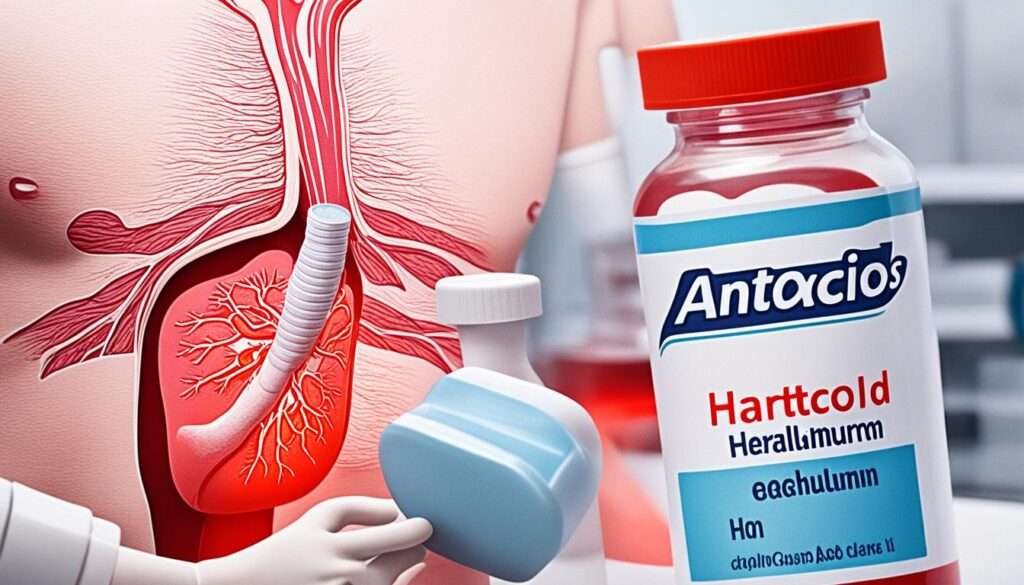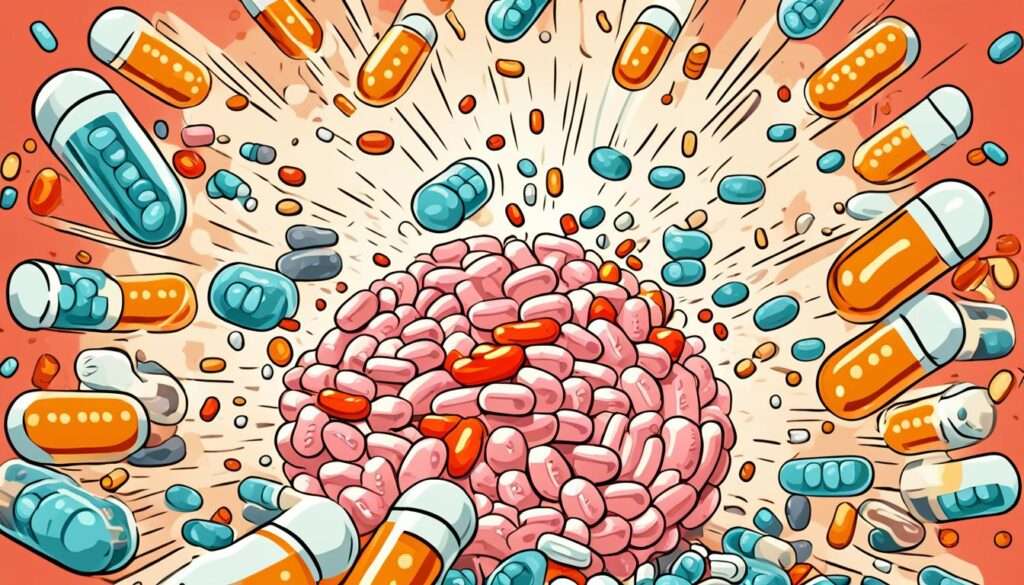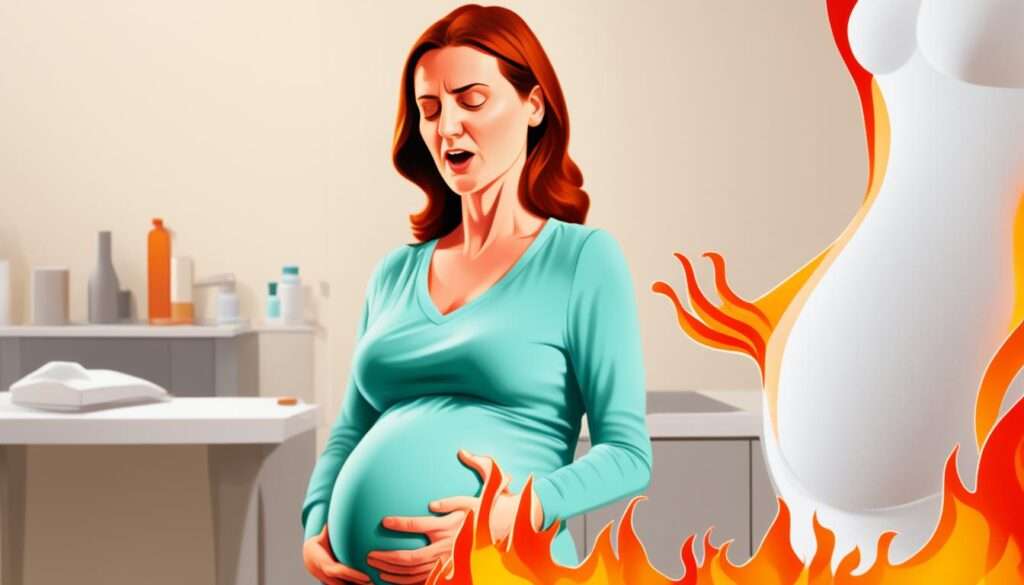Stomach pain and heartburn are common issues that can stem from many things. These include acid reflux, digestive disorders, food intolerances, allergies, and lifestyle choices. Knowing what causes these symptoms is key to managing and preventing them.
Table of Contents
ToggleGastroesophageal reflux disease (GERD) is a big cause of stomach pain and heartburn. It happens when the muscle at the top of the stomach weakens. This lets stomach acid flow back up into the esophagus, causing a burning feeling, trouble swallowing, and a sour taste.
Other digestive problems like gastritis and peptic ulcers can also cause stomach pain. Food intolerances and allergies, such as lactose intolerance and gluten sensitivity, can lead to similar symptoms. Some medicines and supplements, along with stress and bad eating habits, can make these problems worse.
Pregnancy can also affect digestion, causing more stomach pain and heartburn. Hormonal changes and the growing baby can put pressure on the stomach. Knowing the causes and risk factors is important for managing these digestive issues and preventing complications.
Understanding Stomach Pain and Heartburn
Stomach pain and heartburn can make life uncomfortable. Knowing what they are, their symptoms, and what causes them helps in managing them.
Definition and Symptoms
Stomach pain, or abdominal pain, means feeling discomfort in the upper belly. Heartburn is a type of stomach pain that feels like a burning in the chest. Symptoms also include bloating, nausea, and trouble swallowing.
Common Triggers and Risk Factors
Certain foods, eating too much, lying down after eating, and stress can trigger stomach pain and heartburn. Being overweight, pregnant, or taking certain medicines can also raise your risk.
To control stomach pain and heartburn, know and avoid your triggers. Live healthily and see a doctor if symptoms don’t go away or get worse.

Digestive System Disorders
Stomach pain and heartburn often come from digestive system issues. Gastritis and gastroesophageal reflux disease (GERD) are two main causes.
Gastritis and Ulcers
Gastritis is when the stomach lining gets inflamed. It can happen from too much alcohol, some medicines, or infections. This can cause belly pain, nausea, and stomach ulcers.
Ulcers are sores in the stomach or small intestine lining. If not treated, they can lead to ongoing stomach pain and heartburn.
Gastroesophageal Reflux Disease (GERD)
GERD is a chronic acid reflux condition. It happens when the muscle at the stomach opening doesn’t work right. This lets stomach acid flow back into the esophagus.
This can cause irritation and damage to the esophagus. It leads to heartburn and other bad symptoms.

Fixing digestive issues like gastritis, ulcers, and GERD is key to stopping stomach pain and heartburn. Knowing the causes and taking action can help you feel better and avoid more problems.
Food Intolerances and Allergies
Food sensitivities or allergies can cause stomach pain and heartburn. Finding and avoiding these foods can help ease digestive issues.
Lactose intolerance is a common issue. It happens when the body can’t break down lactose in dairy products. This leads to bloating, gas, and stomach pain. Cutting down on dairy can help manage these symptoms.
Food allergies make the immune system react to certain foods. This can cause nausea, vomiting, and stomach pain. Foods like peanuts, tree nuts, shellfish, and gluten can trigger these reactions.
If you think food sensitivities or allergies are causing your stomach pain and heartburn, it’s important to find out what foods to avoid. Keeping a food diary, getting advice from a healthcare professional, and doing allergy tests can help. By dealing with food-related digestive issues, you can feel better and improve your digestive health.

Lifestyle Factors
Your daily habits and lifestyle choices can greatly affect your digestive health. They can lead to stomach pain and heartburn. Knowing how diet, eating patterns, and stress management work can help you find and fix the root causes of your digestive issues.
Diet and Eating Habits
The foods you eat and how you eat them play a big role in stomach pain and heartburn. Foods like spicy, fried, or acidic ones can make your stomach produce too much acid. This can cause acid reflux and discomfort. Also, eating too much, having big meals, and lying down after eating can make these problems worse.
Stress and Anxiety
Stress and anxiety can really affect your digestive system. When stressed, your body releases hormones that make your stomach produce more acid and tighten your stomach muscles. This can make stomach pain, heartburn, and other digestive problems worse.

By changing your diet, eating habits, and how you handle stress, you can ease stomach pain and heartburn. This can also boost your overall digestive health.
Medications and Supplements
Some medicines and supplements can cause stomach pain and heartburn. Over-the-counter and prescription drugs like pain relievers, antibiotics, and blood pressure meds can irritate the stomach lining. They can also relax the lower esophageal sphincter, letting stomach acid flow back up.
Supplements like iron and calcium can also cause stomach discomfort. If you’re dealing with ongoing stomach issues, it’s key to talk to your healthcare provider. They can explain the possible side effects of your meds or supplements and suggest ways to ease your symptoms.
By working with your doctor, you can manage your stomach pain and heartburn. This way, you can still use the medications or supplements you need.

- Certain pain relievers, antibiotics, and blood pressure medications can irritate the stomach lining or relax the lower esophageal sphincter, leading to heartburn and stomach issues.
- Supplements like iron and calcium can also sometimes cause digestive discomfort.
- Consulting with a healthcare provider is important to understand the potential side effects of any medications or supplements and find ways to manage your symptoms.
Being aware of how medications and supplements affect your stomach can help you prevent or manage stomach pain and heartburn. Always work closely with your healthcare provider to find the right solution for you.
Stomach Pain and Heartburn During Pregnancy
Pregnancy is a special time, but it can also bring challenges like pregnancy heartburn and gestational acid reflux. These issues happen because the body changes a lot during pregnancy.
The growing uterus puts pressure on the stomach, pushing stomach contents back up. Hormones also relax the muscle that keeps acid down, making heartburn worse. This is often more severe in the third trimester.
There are ways to ease these symptoms. Eating foods that aren’t spicy, fried, or acidic can help. Drinking lots of water and eating smaller meals often can also help. Sometimes, over-the-counter antacids or prescription medicines can ease the discomfort.
Simple changes in daily life can also help. Avoiding lying down right after eating can reduce pregnancy heartburn and gestational acid reflux. By taking steps to manage these issues, moms-to-be can enjoy their pregnancy more.

Preventing Stomach Pain and Heartburn
Frequent stomach pain and heartburn can be really uncomfortable. But, there are steps you can take to avoid these issues. By changing your diet and adopting healthier habits, you can lessen heartburn, stop stomach pain, and boost your digestive health.
Dietary Changes
Being careful with your diet is a key way to stop stomach pain and heartburn. Stay away from spicy, fried, or acidic foods that can make things worse. Instead, eat more fruits, veggies, whole grains, and lean meats. Eating smaller meals often can also help by not overloading your digestive system.
Lifestyle Modifications
Changing your lifestyle can also help a lot. Keeping a healthy weight is important because extra pounds can put pressure on your stomach and cause problems. Stress and anxiety can make symptoms worse, so finding ways to relax like meditation or deep breathing can help. Quitting smoking and drinking less alcohol are also good steps to take.
By making these changes in your diet and lifestyle, you can actively work on reducing heartburn, stopping stomach pain, and keeping your digestive system healthy.
Home Remedies for Stomach Pain and Heartburn
If you’re dealing with ongoing stomach pain or heartburn, you might look for help beyond prescription drugs. Luckily, there are many natural remedies and over-the-counter options that can ease your discomfort.
Natural Remedies
Ginger, aloe vera, and chamomile tea are great for easing stomach pain and heartburn. Ginger’s anti-inflammatory effects soothe an upset stomach. Aloe vera juice can lessen inflammation in the esophagus. Drinking chamomile tea might also calm your digestive system.
Over-the-Counter Treatments
- Antacids like Tums or Rolaids can quickly neutralize stomach acid and ease heartburn.
- H2 blockers, such as Pepcid or Zantac, cut down the stomach’s acid production.
- Proton pump inhibitors, including Prilosec or Nexium, block acid production more effectively and help heal the esophageal lining.
Finding the right solution often takes some trial and error. Always talk to your healthcare provider to find the best home remedies or over-the-counter treatments for you. Make sure they won’t interact with any other medicines you’re taking.

When to Seek Medical Attention
Dealing with stomach pain or heartburn at home is usually okay. But, there are times when you should get medical help. If your symptoms are severe, don’t stop until you talk to a doctor.
Here are some signs you should see a doctor:
- Difficulty swallowing or a feeling of food getting stuck in your throat
- Unexplained and significant weight loss
- Recurring episodes of vomiting
- Presence of blood in your stool or vomit
Seeing a doctor quickly can help figure out what’s causing your pain or heartburn. They can give you the right treatment. Don’t wait if your symptoms are bad or keep coming back. Early help can make things better.
Even if you can manage your stomach issues with changes in your life and over-the-counter meds, it’s wise to be careful with your health. Getting medical help when needed makes sure you get the right diagnosis and treatment.
Stomach Pain and Heartburn
Stomach pain and heartburn can really affect your health and well-being. It’s important to know what causes them. This knowledge helps you manage your symptoms and keep your digestive system healthy.
Common Causes
There are many reasons why you might have stomach pain and heartburn. Some common causes are:
- Digestive system disorders, such as gastritis, ulcers, and Gastroesophageal Reflux Disease (GERD)
- Food intolerances or allergies, which can trigger an inflammatory response in the digestive tract
- Lifestyle factors, including poor diet, sedentary habits, and high stress levels
- Certain medications, such as nonsteroidal anti-inflammatory drugs (NSAIDs) or antibiotics
Risk Factors
Some things can make you more likely to have stomach pain and heartburn. These include:
- Obesity, which can put additional pressure on the digestive system
- Pregnancy, as hormonal changes and the growing uterus can affect digestion
- Certain medical conditions, such as diabetes or Hiatal hernia
- A sedentary lifestyle, which can slow down digestion and contribute to symptoms
Knowing what causes stomach pain and heartburn helps you manage your symptoms. You can make changes in your diet and lifestyle. Also, see a doctor for chronic or severe issues. And find treatments for the underlying causes.
Diagnosing the Underlying Cause
If you’re dealing with ongoing stomach pain or heartburn, finding the cause is key. Your doctor might suggest different tests and evaluations to figure out what’s going on.
Medical Tests and Evaluations
Your doctor may do the following tests to find out why your digestion is off:
- Physical examination: Your doctor will check your abdomen for tenderness or swelling and look at your overall health.
- Blood tests: These can spot conditions like anemia, infections, or problems with your liver or pancreas.
- Endoscopy: This uses a small tube with a camera to look at your esophagus, stomach, and upper small intestine.
- Imaging scans: Your doctor might use X-rays, CT scans, or other tests to see your digestive system and find any problems.
With these medical tests for stomach pain, your healthcare provider can pinpoint the underlying digestive issues. Then, they can create a plan to ease your symptoms.
Treatment Options for Stomach Pain and Heartburn
If you’re dealing with ongoing stomach pain or heartburn, you’re not alone. There are many ways to help with these issues. It’s important to work with your healthcare provider to find the right treatment for you.
Medications for Stomach Pain and Heartburn
Medications are often the first step in fighting stomach pain and heartburn. Your doctor might suggest over-the-counter or prescription options, such as:
- Antacids: These quickly neutralize stomach acid.
- H2 blockers: These lower the amount of stomach acid made.
- Proton pump inhibitors (PPIs): These strong medicines block acid production for long-term relief.
Always follow the instructions and dosage closely. Using these medicines wrong can cause side effects or problems with other drugs you take.
Surgical Options for Chronic Heartburn (GERD)
For severe or ongoing GERD, surgery might be an option. Laparoscopic fundoplication is a common surgery. It tightens the valve between the stomach and esophagus to stop acid reflux. This can help people with GERD who don’t get better with other treatments.
Talking about the benefits and drawbacks of different treatments with your healthcare provider is key. With the right treatment, you can manage your digestive issues and improve your life.
Conclusion
Managing stomach pain and heartburn means understanding what causes them. It’s important to look at digestive disorders, food intolerances, and allergies. Also, consider how your diet, stress, and medicines affect you.
It’s key to see a doctor if you’re having trouble. They can find the root cause and treat it. With changes in your lifestyle, home remedies, and expert advice, you can handle stomach pain and heartburn better.
By focusing on your digestive health and making smart choices, you can overcome stomach pain and heartburn. This leads to a better life and better health overall.
FAQ
What are the common causes of stomach pain and heartburn?
Stomach pain and heartburn can come from many things. This includes issues with the digestive system, food allergies, and certain medicines.
What are the symptoms of stomach pain and heartburn?
Symptoms include a burning feeling, bloating, nausea, and trouble swallowing. These can happen with certain foods, eating too much, or lying down after eating. Stress can also be a trigger.
How do digestive system disorders contribute to stomach pain and heartburn?
Problems like gastritis, stomach ulcers, and GERD can cause stomach pain and heartburn. They irritate the digestive system.
Can food intolerances and allergies cause stomach pain and heartburn?
Yes, food intolerances and allergies can lead to bloating, gas, and stomach discomfort.
How do lifestyle factors impact stomach pain and heartburn?
Eating too much or too late, and stress can make stomach acid go up. This can cause discomfort.
Can medications and supplements cause stomach pain and heartburn?
Yes, some medicines and supplements can irritate the stomach or relax the muscles that keep stomach acid down.
Why are stomach pain and heartburn more common during pregnancy?
Pregnancy can make these issues worse because the growing baby puts pressure on the stomach. Hormones also relax the muscles that keep stomach acid down.
What steps can be taken to prevent or manage stomach pain and heartburn?
Eating differently, like avoiding certain foods, and eating smaller meals can help. Staying upright after eating and keeping a healthy weight can also help. Reducing stress is important.
What are some home remedies and over-the-counter treatments for stomach pain and heartburn?
Natural remedies like ginger, aloe vera, and chamomile tea can soothe the stomach. Antacids, H2 blockers, and proton pump inhibitors can also help by neutralizing stomach acid.
When should someone seek medical attention for stomach pain and heartburn?
See a doctor if symptoms are bad, don’t go away, or make daily life hard. This is especially true if you have trouble swallowing, lose weight without trying, vomit a lot, or see blood in your stool or vomit.
Source Links


